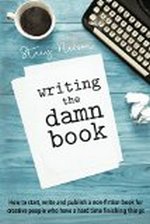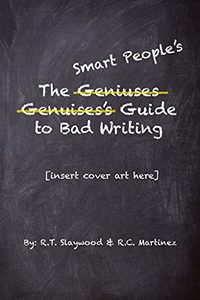 |
Writing The Damn Book: How to Start, Write And Publish A Non-Fiction Book For Creative People Who Have A Hard Time Finishing Things
by Stacy Nelson
Kindle Edition, 83 pg.
BadAss Publishing Co., 2016

Practical Magic for Alchemists Who Like to Play in the Esoteric Sandbox
by Erika Nall
(I had the privilege of reading this book before it was released to the masses.)
The “Who Is Your Reader?” section is the MOST IMPORTANT section. It stopped me dead in my tracks!
I’ve bought countless courses and trainings but something always felt off. I couldn’t quite put my finger on it. All of them had me “start with the end in mind.” I was painting these beautiful pictures of my days, my 3 months from now, my 1 year from now, and beyond. It was so yummy. It tapped into my superpower of visioneering. It satisfied my romanticism. It validated my idealism. Then I reversed engineered to create that in the present.
However, when it came to my readers and clients the “guru” always had me start at the beginning of their journey. “What are her pain points?”
EVERY. SINGLE. TIME. I start there my stomach clenches and my heart shrinks. Inside I feel small and powerless. I get confused and lack clarity. OUCH! It’s painful.
I can hear it now:
Guru: “Lean into your discomfort. Just push through it. This is good for you. This is an opportunity to grow.”
Me: “Um, I don’t think you understand this is not uncomfortable like my shoes are a little too tight or I have a bit of indigestion from the pepperoni pizza I just ate. This is killing me inside.”
Guru: “Well, that’s just a thought. Notice the thought. Let it go back from where it came. Back into nothingness.”
Me: “I don’t think you heard me. THIS IS LITERALLY KILLING ME INSIDE! I avoid death as much as possible thank-you-very-much.”
(And as an alchemist, I know I can excel in the dark art of manipulation to get what I want. I always felt like I went there when I started with pain. “I can help you. Or, better yet “I can save you.”)
Why do I die inside when I start with pain?
My reader is me. I am her. When I talk about her beginning, I am talking about my beginning. When I talk about her insecurities, I am talking about my insecurities. And believe me, they like to show up and be a part of the show anytime they can.
Now, I understand why the beginning is a terrible place to start. Brains are pretty clueless. Whatever it’s thinking, it perceives as reality. That’s its job. And, mine does it very well.
Now I understand that those sensations. That experience is also what happens when I am insecure.
When I wanted to share my message through writing, my self-assurance, my self-confidence, my self-trust was nowhere to be found. Frozen, I just stared at that incessant blinking damn cursor for hours as the insecurities played and had their fun in my head. Frustrated and feeling rather poorly about myself, I would give up. I’d walk out of my office thinking, “What’s wrong with me? How can I usually write so freely and unabashedly with great perseverance one minute, but not the next.”
I wrote the answer, “who is your reader going to BE at the end of the book?” (Honestly, I wasn’t sure if this was going to work.)
And, I felt it. For the first time I felt that what I wrote was coming from a deep place inside of me and not my head. I expected the sensation to be like a blast of, or at least a pulsating, bright light. (Well, that what I thought was suppose to happen when you are passionate and empowered.) Instead, my stomach was relax and I felt a gentle pressure across my chest. It was a constant glow and warmth like after the fire burnt up the firestarters -the tender and the kindling- and it’s just being a fire, doing what fires do. Sure there was an occasional popping of pitch, but I didn’t stop. My fingers just pounded a bit harder on the keyboard.
My breath deep and long. Every once in awhile tears would run down my face. My mind quiet. There was no judging. I just typed. I didn’t set a timer like I usually do to keep me on track. When I felt like I got up into my head, I paused, looked out the window and watched the birds for a little bit, took a few deep breaths, and went back to writing. When all that I had inside was out in black and white -unedited and raw- I looked at the clock and only 50 minutes had passed – talk about flow, baby.
I took a deep breath, exhaling slowly, coming back to my surroundings. Then my intuition said, “Is this making her BE EMPOWERED?” And, I cried.
Several times since then, I’ve tapped back into empowered and I’ve cried every time. Not because I am sad, or happy, or relieved because now I can feel the glorious ginormity of it. How badly, how passionately I want that for my readers AND for me.
You see, I was asking the wrong question. I was starting in the wrong place.
Now when I begin with the energetics of empowerment, I write within the place of security. My assurance, confidence, and trust will be front and center. And, when the writing gets hard and there is a call to perseverance, THIS is what will pull me through the challenges of spreading my message in whatever form I choose.
—–

by James Hutchings
Kindle Edition, 453 pg.
2016

You know what this book could’ve used? An introduction. Just something to ground the reader in the books intention, design, scope . . . something. It just dives in, you flip from the Table of Contents to the first entry.
The only way you know what the book is for is to have read the description from Goodreads/ebook seller:
If you want to spark new ideas for worlds, plots or characters, you want Ideas and Inspiration for Fantasy and Science Fiction Writers. Medicinal corpses, the jargons of thieves and carnies, Nazi UFOs, the colonization of space and green children from nowhere are only a few of the topics covered. This sourcebook is for all writers of fantasy or science fiction–whether novels, short stories, games, or any other form of storytelling.
The afterword touches on it a little, but who wants that at the end of a book?
Smoother writing, maybe a touch of personality to the writing would’ve been a plus, too.
It’s not something you can read cover-to-cover, it’s a resource book that you can consult, or flip through. I’m pretty sure I’ve read almost all of it over the course of a couple of weeks. It sparked an idea or two (not that I have time for them), but that’s about it.
I guess, this book set out to do what it intended, is thorough, easy to read, so . . . 3 stars? Next time you’re trying to prepare for NaNoWriMo or a Creative Writing course, give it a thumb-through.
Disclaimer: This book was provided to me by the author in exchange for an honest review.
—–

We all know we’re not supposed to judge a book by its cover (yet, publishing companies spend big bucks on cover design/art–and I love this cover). But, the opening sentence(s)/paragraph(s) are fair game. So, when I stumble on a good opening (or remember one and pull it off the shelves), I throw it up here. In this selection, we learn everything — practically everything, anyway — we that need to know about our narrator, the next 300+ pages is just filling in the details.
I love this kind of opening.
—–
Truth be told, I’m not an easy man. I can be an entertaining one, though it’s been my experience that most people don’t want to be entertained. They want to be comforted. And, of course, my idea of entertaining might not be yours. I’m in complete agreement with all those people who say, regarding movies, “I just want to be entertained.” This populist position is much derided by my academic colleagues as simpleminded and unsophisticated, evidence of questionable analytical and critical acuity. But I agree with the premise, and I too just want to be entertained. That I am almost never entertained by what entertains other people who just want to be entertained doesn’t make us philosophically incompatible. It just means we shouldn’t go to movies together.
The kind of man I am, according to those who know me best, is exasperating. According to my parents, I was an exasperating child as well. They divorced when I was in junior high school, and they agree on little except that I was an impossible child.
from Straight Man by Richard Russo
|



![]()






